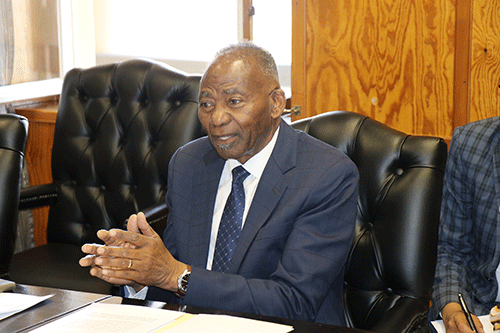Speaker of the National Assembly Peter Katjavivi says parliament continuously searches for new ways to ensure gender inclusivity and gender equality in all spheres of society, as well as the protection of women through sound legislation.
Katjavivi was contributing during the general debate of the 145th Inter-Parliamentary Union (IPU) assembly on Wednesday under the theme ‘Gender Equality and Gender-sensitive Parliaments as Drivers of Change for a More Resilient and Peaceful World’ in Rwanda’s capital, Kigali. “On gender-based budgeting, it is significant that we are gender-sensitive parliaments who endorse budgets that are meant to protect and empower the girl–child, promote youth inclusion in the national debate and nation-building, and also emancipate women,” he stated. Gender budgeting means formulating budgets or examining them from a gender perspective. This is also referred to as gender-sensitive budgeting; the practice does not entail dividing budgets for women. It aims at dealing with budgetary gender inequality issues, including gender hierarchies and the inconsistencies between women’s and men’s salaries. He added: “Even through achieving accolades as a nation, we acknowledge that Namibia still experiences comparatively high income inequality, across all genders. Perhaps this is where gender-based budgeting will play a key component in economically emancipating our citizens.” Katjavivi observed that the Namibian parliament is interested in improving its capacity in the gender-based budgeting and parliament engagement on the SDGs’ components, which are at the core of gender parity and empowerment.
“Our painful history with the apartheid system negatively affected all aspects of development in our country. Nonetheless, in 2019, we witnessed the launch of the African Gender Index (AGI) report at the Fourth Global Gender Summit, here in Kigali, which indicated that Namibia has achieved 79.67% gender equality,” he reminded the audience.
In the Namibian parliament’s two chambers, women constitute 46.88% of the members. Katjavivi said representation hinges on the number of female parliamentarians’ vis-a-vis their male counterparts. This also boils down to females in positions of speakers, deputy speakers, chairpersons of various parliamentary standing committees, female clerks of parliaments and eventually females heading various departments in parliaments.
“This was primarily achieved through a political decision taken by the governing Swapo party. The party introduced the conceptual ‘zebra list’ in its efforts towards achieving the SADC Protocol on Gender and Development, which aims for 50/50 representation in all government and political positions,” he expanded.



